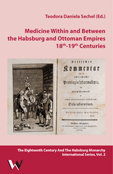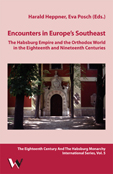Zu diesem Buch

For centuries, southeastern Europe had primarily been associated with the threat of the Ottoman Empire. Then, the Habsburg Monarchy moved towards the Balkan countries. This
led ultimately to various encounters and new interrelations in politics, economics, society and culture. Not only did profound changes occur in the newly acquired territories, but
also in those of the Habsburg Empire itself. Migration from the nations beyond the southeastern imperial borders provided new aspects, for instance, for cultural, intellectual and
religious life in many towns while enlightened absolutism initiated modernism in both administration and society of the new territories. This process of integration granted manifold
perspectives. Researchers from this region and beyond present some of these aspects in this volume.

Nach zwei Jahrhunderten der Konfrontation führt das Heranrücken der Habsburgermonarchie an die Balkanländer im 18. Jahrhundert zu einer Fülle von
Begegnungen und Verflechtungen in Politik, Wirtschaft, Gesellschaft und Kultur. Diese rufen tiefgreifende Veränderungen nicht nur in den Gebieten der Neoacquistica
hervor, sondern auch in den sonstigen Territorien des Habsburgerreiches. Migrationen aus den Gebieten jenseits der südöstlichen Grenzen verleihen dem kulturellen,
intellektuellen und religiösen Leben in vielen Städten und Märkten der Monarchie neue Facetten, während die Maßnahmen des aufgeklärten
Absolutismus zu grundlegender Modernisierung in Verwaltung und Gesellschaft führten. Dieser Integrationsprozess hat eine beträchtliche Horizonterweiterung mit sich
gebracht, und im vorliegenden Band werden darüber einige Aspekte von Fachleuten aus Griechenland, Serbien, Bulgarien, Russland, Frankreich, Deutschland und
Österreich skizziert.
Contents
Harald Heppner, Eva Posch
Introduction
Miloš Ðordevic
Die Einrichtung moderner Institutionen im Königreich Serbien in der Zeit der österreichischen Verwaltung (1718–1739)
Vladimir Simic
"Gnädiger Kaiser" und "treuer Untertan". Dynastic Patriotism and Orthodox Subjects in the Eighteenth-Century Habsburg Monarchy
Marija Petrovic
Austrian Enlightenment the Orthodox Way: The Church Calendar of the Habsburg Serbs and the Josephinist Reforms
Jovan Pešalj
The Mobility Control of the Ottoman Migrants in the Habsburg Monarchy in the Second Half of the Eighteenth Century
Mariya Baramova
Nikolaus Ernst Kleemanns Reisen von Wien über Belgrad bis Kilianova und die Neuentdeckung des Donauraums in der Habsburgermonarchie
Peter Mario Kreuter
Franz Leopold von Metzburg und Nicolae Mavrogheni. Momentaufnahmen einer schwierigen Beziehung zweier diplomatischer Welten
Ivan Parvev
Joy and Glory – Die Eroberungen Belgrads 1717 und 1789 als Medienereignis im Alten Reich
Benjamin Landais
Habsburg’s State and the Local Orthodox Elite: The Case of the Banat of Temesvár (1750–1780)
Ikaros Madouvalos
Conscriptiones Graecorum in Eighteenth-Century Central Europe. Crossing Borders: The Sociocultural Identification of Migrants from the Balkans to Hungarian Territories
Olga Katsiardi-Hering
Southeastern European Migrant Groups between the Ottoman and the Habsburg Empires: Multilateral Social and Cultural Transfers from the Eighteenth to the Early Nineteenth
Centuries
Maria A. Stassinopoulou
Trading Places: Cultural Transfer Trajectories among Southeast European Migrants in the Habsburg Empire
Vaso Seirinidou
The Enlightenments within the Enlightenment: Balkan scholarly production and communication in the Habsburg Empire as seen through an Early Nineteenth-Century Private
Library Catalogue
Nenad Ristovic
Acculturation versus Assimilation. The Role of the Orthodox Church in the Organization of Western Modern-Age Classical Education among the Serbs in the Habsburg Monarchy
Dragana Grbic
Cosmopolitanism and Nationalism – The Case of Dositej Obradovic
Wladimir Fische
Dositej Obradovic and the Ambivalence of Enlightenment
Andreas Lyberatos
Clocks, Watches and Time Perception in the Balkans: Studying a Case of Cultural Transfer
Andrej S. Riazhev
Russian Enlightened Absolutism and Religious Minorities in East and South-Eastern Europe in the Second Half of the Eighteenth Century
Summaries
Contents
Harald Heppner, Eva Posch: Introduction · Miloš Ðordevic: Die Einrichtung moderner Institutionen im Königreich Serbien in der Zeit der
österreichischen Verwaltung (1718–1739) · Vladimir Simic: "Gnädiger Kaiser" und "treuer Untertan". Dynastic Patriotism and Orthodox Subjects
in the Eighteenth-Century Habsburg Monarchy · Marija Petrovic: Austrian Enlightenment the Orthodox Way: The Church Calendar of the Habsburg Serbs and the
Josephinist Reforms · Jovan Pešalj: The Mobility Control of the Ottoman Migrants in the Habsburg Monarchy in the Second Half of the Eighteenth Century
· Mariya Baramova: Nikolaus Ernst Kleemanns Reisen von Wien über Belgrad bis Kilianova und die Neuentdeckung des Donauraums in der
Habsburgermonarchie · Peter Mario Kreuter: Franz Leopold von Metzburg und Nicolae Mavrogheni. Momentaufnahmen einer schwierigen Beziehung zweier
diplomatischer Welten · Ivan Parvev: Joy and Glory – Die Eroberungen Belgrads 1717 und 1789 als Medienereignis im Alten Reich · Benjamin
Landais: Habsburg’s State and the Local Orthodox Elite: The Case of the Banat of Temesvár (1750–1780) · Ikaros Madouvalos:
Conscriptiones Graecorum in Eighteenth-Century Central Europe. Crossing Borders: The Sociocultural Identification of Migrants from the Balkans to Hungarian Territories
· Olga Katsiardi-Hering: Southeastern European Migrant Groups between the Ottoman and the Habsburg Empires: Multilateral Social and Cultural Transfers from
the Eighteenth to the Early Nineteenth Centuries · Maria A. Stassinopoulou: Trading Places: Cultural Transfer Trajectories among Southeast European Migrants in
the Habsburg Empire · Vaso Seirinidou: The Enlightenments within the Enlightenment: Balkan scholarly production and communication in the Habsburg Empire as
seen through an Early Nineteenth-Century Private Library Catalogue · Nenad Ristovic: Acculturation versus Assimilation. The Role of the Orthodox Church in the
Organization of Western Modern-Age Classical Education among the Serbs in the Habsburg Monarchy · Dragana Grbic: Cosmopolitanism and Nationalism
– The Case of Dositej Obradovic · Wladimir Fische: Dositej Obradovic and the Ambivalence of Enlightenment · Andreas Lyberatos: Clocks,
Watches and Time Perception in the Balkans: Studying a Case of Cultural Transfer · Andrej S. Riazhev: Russian Enlightened Absolutism and Religious Minorities
in East and South-Eastern Europe in the Second Half of the Eighteenth Century · Summaries



